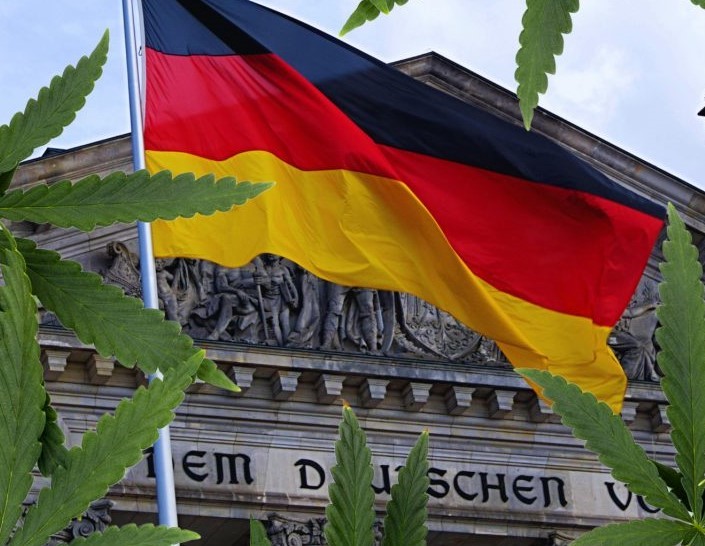
On April 1st, Germany will begin the process of legalizing Cannabis as the cannabis bill has been successfully passed.
The Bundesrat in Germany has voted in favour of a national legalization measure for cannabis for adults. The measure, known as CanG, had already been approved by the Bundestag in February.
Despite facing opposition in the Bundesrat, which represents the sixteen Länder of Germany at the federal level, the measure will now take effect on April 1st. This vote marks a significant change in drug policy and has been hailed as a historic event by Kai Friedrich Niermann, a prominent attorney at KFN+ Law Office. Niermann believes this move towards a more modern drug policy will prioritize both health protection and civil liberties for the population, specifically in regard to cannabis.
Starting on April 1, 2024, adults in Germany will be allowed to grow cannabis in their own homes and possess a personal amount, while non-commercial cannabis clubs will also be permitted in the initial phase of legalization. Additionally, there are plans for regional pilot programs for adult-use cannabis commerce in the future. Following the successful vote, lawmakers in the Bundestag wasted no time in expressing their reactions.
A total of 407 Members of Parliament (MPs) gave their approval to the proposed bill, while 226 MPs opposed it and 4 MPs abstained from voting. This legislation permits the non-profit growth and regulated distribution of cannabis by Cannabis clubs. As a result, Germany will soon have some of the most relaxed laws regarding marijuana in Europe, where the drug remains illegal in the majority of countries.
In Malta, adults are allowed to possess up to 7g of cannabis and grow up to four plants at home, according to the law passed in 2021, but smoking marijuana in public is still not allowed. Similarly, in Luxembourg, private use of cannabis and the cultivation of four cannabis plants have been tolerated since this year, and the possession of cannabis in public has been decriminalized.
According to reports, the German Health Minister, Karl Lauterbach, has issued a "protocol declaration" to the Bundesrat before the vote today to prevent any delay in the measure's approval. If the measure were to be sent to a mediation committee, it was expected to prolong the implementation of legalization by up to six months.
However, the measure is still on track to be enforced on April 1st. Lauterbach expressed his satisfaction by stating, "The effort was worth it, cannabis legalization will take place on Easter Monday!" in a social media post. He also urged responsible usage and protection of children and young people with the new opportunity, hoping that this will mark the end of the black market.
Lawmakers in Germany will now switch their focus to crafting the ‘second phase’ of Germany’s legalization plan which will involve the launch of regional adult-use cannabis commerce pilot programs. The pilot programs will permit cultivators, retailers, and consumers to participate in legal commerce at a local level to collect data and conduct research.
What sets the new law apart from previous proposals?
Initially, the German Government's reform plans included a regulated retail market, similar to Canada's model, along with provisions for home growing and membership-based cannabis associations.
The Free Democratic Party of the Government coalition was particularly interested in promoting the economic potential of a commercial model. However, these plans were limited by restrictions from both UN international drug control treaties and EU laws, which currently prohibit the commercial production and sale of cannabis for non-medical purposes.
While some countries have disregarded the UN treaty prohibitions and made progress with reforms, the EU restrictions present a more immediate obstacle with potential political consequences and tensions with neighbouring countries, as well as enforceable sanctions.
Despite the initial goal of a commercial retail market, Germany has now followed Malta's lead in adopting a more restricted non-commercial approach, which is also being followed by Luxembourg and Czechia, at least for the time being.
The German Government has announced a plan (yet to be finalized and agreed upon) for a second phase of reforms that will include a limited-time "experiment" with retail sales, similar to ongoing experiments in the Netherlands and Switzerland, in certain municipalities.
This is proposed as a "scientific research" project, rather than a formal change to the law, in order to navigate around the EU and international UN prohibitions, although this has not yet been officially tested. No timeline has been announced for this experiment.
Germany's influential role in European politics and global authority make this a crucial moment, representing a truly historic step forward for EU and global reform. While some business interests may be disappointed with the non-commercial model in the short term, the German reforms provide an opportunity for the non-profit model to establish itself and demonstrate its value.
However, home growing and non-profit associations will likely not be able to meet all of Germany's demand, as non-residents will not have access to any legal supply. Therefore, in the long run, a regulated commercial retail model seems inevitable once the various international legal barriers can be negotiated.
Germany is uniquely positioned to take on a leadership role in achieving the necessary changes in international law and continuing the rapid pace of global change.
The legalisation of cannabis will take place on April 1, with new regulations in effect.
Only individuals who are 18 years and above are allowed to possess cannabis, with a limit of 25 grams on their person and 50 grams at home.
It is permissible to grow up to 3 plants per person, but not per household.
Smoking within 100 meters of schools, kindergartens, playgrounds, and sports facilities is prohibited.
In addition, smoking in pedestrian zones of city centres is not allowed between 7:00 and 20:00.
The THC content of cannabis must not exceed 10%, even though the average is approximately 15%.
It is not possible to purchase cannabis directly from stores, as there are no cannabis stores.
Instead, individuals must either grow their own cannabis or become a member of a cannabis club.
Cannabis clubs will not sell weed, but members can obtain it through the club. Starting from July 1, 2024, cannabis clubs can begin growing cannabis. The rules for these clubs include requiring individuals to become members in order to obtain cannabis.
Clubs are limited to 500 members and can provide 25 grams of cannabis per day or 50 grams per month to its members.
Those under the age of 22 can receive a maximum of 30 grams of cannabis per month.
In order to become a member of a club, an individual must be at least 18 years old and have been a resident for at least 6 months.


DISCLAIMER: To comply with UK law, Discount Cannabis Seeds sells Cannabis Seeds for souvenir and collection purposes only. Discount Cannabis Seeds accepts no liability for customers purchasing them for any other purposes.

Office Address:
PLEASE NOTE OUR BUSINESS IS ONLINE ONLY, NO SEEDS ARE FOR SALE AT OUR OFFICE ADDRESS
49 Station Road
Polegate
East Sussex
BN26 6EA
Email:
[email protected]

Find out about our experience with Trustpilot > DCS & TRUSTPILOT

Discount Cannabis Seeds have been awarded certification by Cannabis Professionals, CannaPro - the trade association for the UK’s cannabis industry.
Copyright © 2024,


